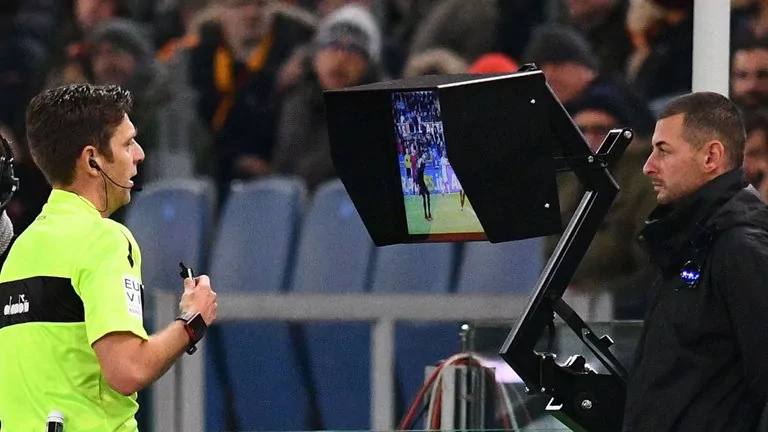Video assistant referee (VAR) technology has already produced plenty of controversy in football, but it is a system that doesn’t look like disappearing any time soon.
VAR will be used at this year’s World Cup in Russia after the International Football Association Board (IFAB), which sets the game’s laws, unanimously approved the use of the technology in matches on a permanent basis.
The system has been trialled in some domestic English cup games this season, and has also been used in other countries around Europe including Germany and Italy.
The Bundesliga, La Liga and Ligue 1 are amongst the competitions who will utilise the technology next season, but it will not feature in either the Premier League or the Champions League.
One of the concerns over VAR is that those watching the games are uncertain about what is going on.
However, FIFA has said it is working on a system that will provide information to the ‘giant screen operators as well as broadcasters and commentators’ about the reason and outcome of a review.
How does VAR work?
VAR operates on a three-step process of incident, review/advice, decision, and across the four areas of football deemed ‘game changing’ by FIFA.
The system is only to be used ‘to correct clear errors and for missed serious incidents’ in those ‘match-changing’ situations. The incidents that can be reviewed are in relation to validity of goals, penalties, direct red cards or mistaken identity for cautions or dismissals.
VARs and other match officials are able to recommend reviews, but the only person who can initiate one is the referee, who will then have the final say on whether their original decision should stand or be changed. They have the option to review footage themselves on a pitch-side monitor before making a final decision.
What has been the reaction to VAR?
VAR has been trialled in the FA Cup and Carabao Cup this season and the feedback on its success has certainly been mixed.
The system was praised after correctly overturning a decision to rule out Kelechi Iheanacho’s strike for Leicester in their 2-0 FA Cup win over Fleetwood during January, but was blasted by Match of the Day pundit Alan Shearer for failing to award Chelsea a penalty in their replay with Norwich.
However, its biggest influence came during a fifth round FA Cup replay between Tottenham Hotspur and Rochdale at the end of February.
Erik Lamela thought he had given Spurs an early lead only for his goal to be ruled out for a foul – but only after lengthy consultation between referee Paul Tierney and his video assistant.
Spurs were later awarded a free-kick when Kieran Trippier was fouled only for Tierney to point to the spot after another VAR ruling.
Heung-Min Son scored, but it was disallowed after he was adjudged to have stopped in his run-up before shooting.
Fans were left scratching their heads during the incidents as the referee waited for instructions in his earpiece and the half-time whistle was greeted by loud booing from home supporters.
There have been numerous controversies elsewhere, with perhaps the most bizarre coming at the Bundesliga match between Mainz and Freiburg during April.
Late in the first-half Mainz had an appeal for handball turned down by the referee Guido Winkmann, with the scores still at 0-0.
The official then blew for the break, allowing the players to go in for half-time – only for the VAR official to give the handball and award a penalty.
Following a delay of almost five minutes, Freiburg’s players had to be recalled from the dressing room after it was ruled that Daniel Brosinski’s cross had been handled by Marc-Oliver Kempf.
Nearly seven minutes after the end of the first 45 minutes were up, Pablo de Blasis converted the penalty to put Mainz 1-0 ahead.
The chaos did little to appease fans who had protested against Monday night matches by showering the pitch with toilet rolls at the start of each half, forcing the second-half to be delayed by 10 minutes.
What does the future hold for VAR?
FIFA’s decision to use VAR at this summer’s World Cup is a major sign that the people charged with running football believe the system is here to stay.
Research taken from the KU Leuven University in Belgium showed that the accuracy of final decisions with VAR since its inception in 2016 stands at over 98 percent – up from 93 percent without.
Despite criticism from people within the game, FIFA believe the system is helping football and that further tweaks to it will only enhance VAR moving forward.
It is likely to be just a matter of time before VAR is adopted across all the major leagues and competitions, particularly once the system is fully linked up with giant screens in the stadiums and to broadcasters.
While both the Premier League and the Champions League have delayed introducing VAR, the clamour from FIFA for the system to be implemented across top level football will eventually prove too strong to resist.
Add Sportslens to your Google News Feed!







